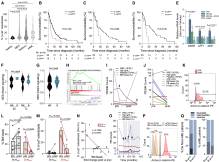
哥伦比亚大学Stavroula Kousteni研究小组近日取得一项新成果。经过不懈努力,他们报道了一个利基驱动的机制决定了骨髓恶性肿瘤的反应和一种不依赖突变的治疗方法。该项研究成果发表在2025年3月27日出版的《癌细胞》上。
在这项研究中,研究人员证明了对治疗的反应性与全反式维甲酸(ATRA)治疗患者成骨细胞中β-catenin-JAG1的激活有关。ATRA抑制患者和白血病小鼠β-连环蛋白活性。因此,它抑制来自具有活性β-catenin-JAG1信号的患者的MDS/AML细胞的生长和存活,并促进其分化。这与细胞遗传学和突变谱无关。ATRA还可以改善小鼠的疾病结局,无复发迹象,并且比SOC具有更高的安全性。人抗JAG1抗体可提高白血病小鼠和患者源性MDS/AML细胞的疗效。β-catenin激活为ATRA的差异反应提供了解释,并为ATRA在髓系恶性肿瘤中的重新定位提供了机制生物标志物,可能避免复发并扩展到广泛的癌症。
据了解,骨髓增生异常综合征(MDS)和急性髓系白血病(AML)等髓系癌症对标准治疗(SOC)和靶向治疗仍然具有耐药性。
附:英文原文
Title: A niche driven mechanism determines response and a mutation-independent therapeutic approach for myeloid malignancies
Author: Ioanna Mosialou, Abdullah M. Ali, Rossella Labella, Brygida Bisikirska, Alvaro Cuesta-Dominguez, Paraskevi Vgenopoulou, Ismarc Reyes, Sanjana M. Rao, Anqi Wang, Na Luo, Marta Galan-Diez, Junfei Zhao, Brian J. Chernak, Jan Philipp Bewersdorf, Kazuya Fukasawa, Jiayu Su, Jason Higa, Rachel A. Adams, Adam L. Corper, Sergey Pampou, Catherine M. Woods, Xiaomin Fan, Roshan P. Shah, Julie Feldstein, Na Liu, Cui Liang, Mal Heiblig, Steven Kornblau, Guillermo Garcia-Manero, Ellin Berman, Joseph G. Jurcic, Raul Rabadan, Azra Raza, Stavroula Kousteni
Issue&Volume: 2025-03-27
Abstract: Myeloid cancers such as myelodysplastic syndromes (MDS) and acute myeloid leukemia (AML) remain resistant to standard of care (SOC) and targeted therapies. In this study, we demonstrate that responsiveness to therapy is associated with activation of β-catenin-JAG1 in osteoblastic cells of patients treated with all-trans-retinoic acid (ATRA). ATRA suppresses β-catenin activity in patients and leukemic mice. Consequently, it inhibits the growth and survival of MDS/AML cells from patients with active β-catenin-JAG1 signaling and promotes their differentiation. This occurs independently of cytogenetics and mutational profile. ATRA also improves disease outcome in mice with no evidence of relapse and a superior safety profile to SOC. A human anti-JAG1 antibody improves efficacy in leukemic mice and patient-derived MDS/AML cells. β-catenin activation provides an explanation for the differential response to ATRA and a mechanistic biomarker for ATRA repurposing in myeloid malignancies, potentially evading relapse and extending across a broad range of cancers.
DOI: 10.1016/j.ccell.2025.03.007
Source: https://www.cell.com/cancer-cell/abstract/S1535-6108(25)00108-4
Cancer Cell:《癌细胞》,创刊于2002年。隶属于细胞出版社,最新IF:38.585
官方网址:https://www.cell.com/cancer-cell/home
投稿链接:https://www.editorialmanager.com/cancer-cell/default.aspx
